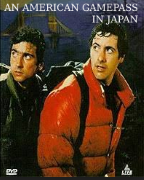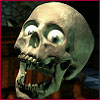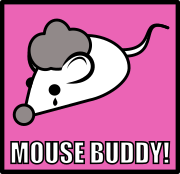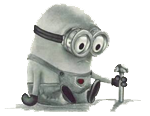|
SuperMechagodzilla posted:This is according to your own argument that the numbers are crucial - that the numbers have a (non-literal!!!) agency that is 'speaking to us' and 'telling us' the conventions we must adhere to. The videogame Half-Life 2 precedes the videogame Half-Life 2: Episode One. The numbers don't have an agency. The text doesn't have agency. When we talk about texts, we often ascribe action to them--"the scene shows us", "the exposition tells us", etc. Perhaps a better word than "tell" is "invoke", but we're still rubbing up against the fact that we're ascribing agency and action to a series of sounds and images. And again, I am not saying that one must adhere to the genre conventions being invoked by the Star Wars movies, just that a reading that claims to be formal should at the very least account for them as more than just delineation of plot order because they invoke a particular genre and genre is part of form. quote:You yourself note that your stance crumbles further when faced with the reality that there are non-numbered Star Wars films, other versions of numbered Star Wars films, "unofficial" Star Wars films, non-film Star Wars media, and even non-Star Wars Star Wars films (e.g. Prospect). This is where history suddenly returns with a vengeance and we realize that you have been arbitrarily excluding all but the most recent editions of the "official" films for no clear reason. Nothing in the text(s) told you to do that. You are once again deferring to a nebulous agent that you refer to as 'convention'. This is fair. I've been assuming we're talking about the movies in their current, readily available form. I should've been more clear. KVeezy3 posted:To that end, isn't 123456 not a formal reading since it isn't 123456789? Why disregard the generic conventions of IP law? Perhaps it's better phrased as an incomplete formal reading, but yes, a formal reading of the Star Wars movies (in their current, readily available form) should include eps 7-9. I apologize that if by focusing on the ordering of the first six, I gave the impression that we shouldn't also include the last three.
|
|
|
|

|
| # ? Apr 27, 2024 06:32 |
|
PeterWeller posted:Perhaps it's better phrased as an incomplete formal reading, but yes, a formal reading of the Star Wars movies (in their current, readily available form) should include eps 7-9. I apologize that if by focusing on the ordering of the first six, I gave the impression that we shouldn't also include the last three. The fabric of space/time is at stake - it's either formal or not, no incompletes.
|
|
|
|
PeterWeller posted:The numbers don't have an agency. The text doesn't have agency. When we talk about texts, we often ascribe action to them--"the scene shows us", "the exposition tells us", etc. Perhaps a better word than "tell" is "invoke", but we're still rubbing up against the fact that we're ascribing agency and action to a series of sounds and images. And again, I am not saying that one must adhere to the genre conventions being invoked by the Star Wars movies, just that a reading that claims to be formal should at the very least account for them as more than just delineation of plot order because they invoke a particular genre and genre is part of form. Genre is not "part of form"; genre is an informal system of classification. It's descriptive. Star Wars (aka Star Wars 4) can be read as a western, science fiction, fantasy, horror, etc. - or as some combination of those. Calling genre "part of form" is putting the cart before the horse. When we are talking about a serial, a serial need only be made up of individual chapters published at regular intervals. And when we look at the date of publication, it turns out that Star Wars (aka Star Wars 4) was published first, followed by Star Wars 5. This regular publication continued for an additional chapter, then resumed after a pause. If you are arguing that Episode 1 should go first, then we are dealing with some highly irregular, overlapping intervals, and therefore not a serial. Your argument would be more compelling if you were saying that the numbered chapters can be read as a reference to the traditional serialized format, and everyone would certainly agree with that. But Star Wars is not a traditional serial for the basic reason that the middle of the story (as distinct from 'discourse', in your terms) was released last - arguably as a joke about that very tradition, akin to the "missing reel" in Planet Terror. Where is the "missing reel"? There isn't one. It's a trick. When was Star Wars first released as a traditional serial? It wasn't. SuperMechagodzilla fucked around with this message at 19:01 on Apr 27, 2021 |
|
|
|
SuperMechagodzilla posted:Genre is not "part of form"; genre is an informal system of classification. It's descriptive. Star Wars (aka Star Wars 4) can be read as a western, science fiction, fantasy, horror, etc. - or as some combination of those. Calling genre "part of form" is putting the cart before the horse. Something's genre is part of its form. Genre is often used, as it is here, to describe the form something takes. We can read Episode 4 as those genres because it takes on the forms of those genres. It also explicitly takes on the form of a serialized space opera. Again, you are conflating the history of the texts' release with the form in which the texts themselves present themselves. That the numbered chapters reference the form of a serial wouldn't be an argument; it would just be an observation.
|
|
|
|
PeterWeller posted:Something's genre is part of its form. Genre is often used, as it is here, to describe the form something takes. We can read Episode 4 as those genres because it takes on the forms of those genres. It also explicitly takes on the form of a serialized space opera. Your epistemology here is completely backwards, you're basically applying Platonic idealism to genre classification. Genre is and always has been subjective shorthand.
|
|
|
|
I've honestly lost track of whatever thesis is being argued here.
|
|
|
|
Maxwell Lord posted:I've honestly lost track of whatever thesis is being argued here. I think the idea is that the prequels narratively precede the OT, and don't just precede them in terms of, like, diegetic chronology. Which is kinda nuts and doesn't really hold true for any kind of prequel, since they're necessarily made in response to some preexisting film.
|
|
|
|
Mechafunkzilla posted:Your epistemology here is completely backwards, you're basically applying Platonic idealism to genre classification. Genre is and always has been subjective shorthand. The concept of genre began as a literal, objective classification of form--poetry, prose, or drama--by Plato's most famous student. It's much more than just subjective shorthand. It's often used as such, but even then, it's based on textual characteristics held in common. And when it's used as such, it's really being used to mean marketing category. Maxwell Lord posted:I've honestly lost track of whatever thesis is being argued here. I just don't think you can classify a reading of the mainline Star Wars movies as a formal one without accounting for the form in which they present themselves. Mechafunkzilla posted:I think the idea is that the prequels narratively precede the OT, and don't just precede them in terms of, like, diegetic chronology. Which is kinda nuts and doesn't really hold true for any kind of prequel, since they're necessarily made in response to some preexisting film. You're talking about the history of the movies' production and release. I am talking about how they present themselves. A formal reading needs to account for how they present themselves.
|
|
|
|
PeterWeller posted:Something's genre is part of its form. Genre is often used, as it is here, to describe the form something takes. We can read Episode 4 as those genres because it takes on the forms of those genres. It also explicitly takes on the form of a serialized space opera. ‘Kay, so now we’ve isolated some specific examples of you just asserting random things as if with some authority. For simplicity, let’s take one example, and use it as representative of the problems that keep recurring: “It also explicitly takes on the form of a serialized space opera.” What do you mean by “it” here? This might seem pedantic, but it’s very important. The way you worded your post implies that “it” is Star Wars: Episode IV: A New Hope - but Star Wars: Episode IV: A New Hope is not a serial. It is a feature film with a runtime of roughly 120 minutes. The phrase “Star Wars: Episode 4: A New Hope is a serialized space opera” would be false. Of course, you are not arguing that it is a serial; you are arguing that it “takes the form of” a serial. So how does it do that, precisely? By what mechanism does the film become what it isn’t? I can speculate as to what you mean (the use of a number ‘IV’ in the title causes the audience to imagine prior nonexistent films so that the very absence of the first three chapters can be read as part of the structure?) - but that is only my speculation. You haven’t given much to work with here. How is it “explicit” and not, like, implicit? These are things you gotta be prepared to answer?
|
|
|
|
That is some fair critique, and it arises from me being imprecise with my language. The irony is not lost on me By "It", I'm doing some equivocating between Star Wars Episode IV and the series as a whole. And "explicitly takes on the form" is poor phrasing. I should say "explicitly present themselves in the form." This is explicit in the title cards and crawls. It's a thing the movies tell you. The movies also implicitly show this to you by taking on a lot of the trappings of serialized space operas. Speaking historically, yes, there was a time when the number implied previous entries in the serial that did not really exist. The series as a whole now includes those episodes. You're right that stating that ep4 is a serialized space opera would be factually incorrect. But I think it's fair to say that the series presents itself as a serial space opera. I've probably said a few times that that is how you "should" take the movies, and for that, I'll also apologize because you "should" the movies however you like. At the very beginning of this, I said the movies invite you to take them that way. I think a formal reading needs to honor or account for that invitation, the form in which they are presenting themselves to you. I think it's something so heavily foregrounded by the opening title and crawl sequences that it's more than just plot delineation.
|
|
|
|
Maxwell Lord posted:I've honestly lost track of whatever thesis is being argued here. Here's the truth: Solo Episode 7 Episode 8 Episode 9 Episode 1 Episode 5 Episode 2 Episode 6 Rogue One Episode 3 Episode 4
|
|
|
|
The United States posted:We're arguing about the best order to watch the star wars in. where in here should you stick a playthrough of KOTOR
|
|
|
|
Mechafunkzilla posted:where in here should you stick a playthrough of KOTOR I guess we can start here: https://www.youtube.com/watch?v=MMAYCB3b7rY
|
|
|
|
I mean, can you really say you've "seen" Star Wars if you didn't sink 500 hours into Bioware's Star Wars: The Old Republic?
|
|
|
|
Mechafunkzilla posted:I mean, can you really say you've "seen" Star Wars if you didn't sink 500 hours into Bioware's Star Wars: The Old Republic? Fortunately, I cannot
|
|
|
|
Star Wars discourse has found its orangutan.
|
|
|
|
PeterWeller posted:You're talking about the history of the movies' production and release. I am talking about how they present themselves. A formal reading needs to account for how they present themselves. What's been left unattended (In your frequent assertions that accounting for the historical removes us too far from the formal), is your particularly unusual concept of form. To say that what is truly formal is generated from what's presented 'in the here and now', irrevocably and paradoxically posits the ultimate historicist stance: that what is the most truthful form of Star Wars is whatever comprises it at this very historical moment. So as of now: readings that comprise the numerical order of episodes 1-9 produce the only truthful formal readings. But what's to stop me from shooting a short film titled "Star Wars: Episode 10", with the requisite opening crawl, and then contend that all formal readings are henceforth rendered false until they see and take my film into consideration? (Assuming here that placing it on YouTube renders it properly available to the general audience.) EDIT: To be clear, I am not a historicist, as I believe Terminator 3 & the theatrical cut of Justice League must be eradicated from existence. But, substantially formal readings of an artwork tend to cohere with release order because the period of conception inescapably forms the artwork. So if the creatives are the slightest bit competent, the extant work will substantially shape their addition to the 'series' to the point that their specific coordinate in history is unavoidable (Like say, Rogue One's sympathetic response to the abomination of the U.S.'s decades long intervention in the Middle East). KVeezy3 fucked around with this message at 00:55 on Apr 28, 2021 |
|
|
|
Maxwell Lord posted:I've honestly lost track of whatever thesis is being argued here.
|
|
|
|
KVeezy3 posted:But what's to stop me from shooting a short film titled "Star Wars: Episode 10", with the requisite opening crawl, and then contend that all formal readings are henceforth rendered false until they see and take my film into consideration? Honestly, KVeezy3, what is holding you back?
|
|
|
|
I mean I have a three movie trilogy pitch set thousands of years after ROS that I think is dope as hell but I'm not wasting it here. But I will give a few teasers. Sith are back but fun. Jedi are now way more assholes corrupted. (think crusader christian cops.) Droids have rebelled, at war with everyone. Everyone's hornier. LionArcher fucked around with this message at 01:46 on Apr 28, 2021 |
|
|
|
PeterWeller posted:By "It", I'm doing some equivocating between Star Wars Episode IV and the series as a whole. And "explicitly takes on the form" is poor phrasing. I should say "explicitly present themselves in the form." This is explicit in the title cards and crawls. It's a thing the movies tell you. The movies also implicitly show this to you by taking on a lot of the trappings of serialized space operas. Again, for simplicity, I’ll stay focussed on the one point. Here your argument splits so that “the series as a whole ... presents [itself] in the form [of a serialized space opera]”, and also that this series has “trappings of” serialized space opera. But this rewording doesn’t clarify much of anything, except that you are referring to multiple films. We could get into the minutia of how you define ‘the series as a whole’, but the more basic question is: why don’t you just say “Star Wars is a serial”? Your curious wording seems to betray an awareness that Star Wars - even “as a whole” - is not a serial. And this is possibly why you’ve included vague reference to “trappings of a serial”. Like, it would be very odd to say that Star Wars Episode 4 has the trappings of a feature film, because that would imply that it is not a feature film. In any case, you still haven’t explained how the films are not-speaking their not-messages to you. How does a series “present itself in a form”?
|
|
|
|
My Star Wars sequel pitch is about a droid named SP-4R71-CU5
|
|
|
|
Maxwell Lord posted:I've honestly lost track of whatever thesis is being argued here. Tracing it back, I wrote that Jar Jar Binks is the protagonist of The Phantom Menace but many in the audience don’t realize this because Jar Jar is nonwhite. Peter then objected that Quigon Jinn must be the protagonist, because: “The protagonist is the focal character that the audience is invited or expected to support in the narrative's conflict.” Everything since has been an effort to discern exactly what entity is inviting Peter and/or expecting him to behave in certain ways. (The current tangent about the dictates of genre convention extended from that.)
|
|
|
|
SuperMechagodzilla posted:Tracing it back, I wrote that Jar Jar Binks is the protagonist of The Phantom Menace but many in the audience don’t realize this because Jar Jar is nonwhite. I wasn't actually objecting to you calling Jar Jar the protagonist, just you rejecting Quigon as a protagonist. The line you quote is another example of poor phrasing on my part. I should've used "a" instead of "the" and not given the impression that I was saying only Quigon was the (only) protagonist. I think they both are, and Jar Jar is a more important one at that. Anyway, I stepped away for a little while to catch my breath and realized I've been being incredibly pedantic and probably very annoying. Apologies everyone. You especially, SMG. But also thanks for humoring me.
|
|
|
|
The framing of qui gonn is ominous for most of the opening. His cloak is black in many shots.
|
|
|
|
For what it's worth, I think the original issue was some confusion of over a focal character and a protagonist. Usually a protagonist is the focal character, but that's not always true. Generally the focal character just means who the story mainly is about. So, in Friday the 13th Part 2, the story is ABOUT Jason, but we're not really invested in Jason's emotional arc or wants. So, Ginny is the primary protagonist while Jason is the focal character. SMG's original contention around Jinn is that he's a focal character because his motivations are obscured from the audience and we're not really allowed to connect with him. It's why categorization or defining terms wasn't necessarily helpful for the conversation. He's essentially arguing that Jinn is not too different than Jason. I disagree with SMG, but he's right that the emotional stakes of Anakin and Jar Jar are much clearer. It's not out of a misunderstanding the terms. Timeless Appeal fucked around with this message at 19:19 on Apr 28, 2021 |
|
|
|
Who is the protagonist of the 1933 film "Dinner at Eight?"
|
|
|
|
FunkyAl posted:The framing of qui gonn is ominous for most of the opening. His cloak is black in many shots. Lucas also mentions in the DVD commentary for the movie that he wanted the Jedi to feel like Godzilla during their attack on the Neimoidians.
|
|
|
|
Timeless Appeal posted:For what it's worth, I think the original issue was some confusion of over a focal character and a protagonist. Usually a protagonist the focal character, but that's not always true. Generally the focal character just means who the story mainly is about. So, in Friday the 13th Part 2, the story is ABOUT Jason, but we're not really invested in Jason's emotional arc or wants. So, Ginny is the primary protagonist while Jason is the focal character. To move on to a slightly different example: even though the bulk of the runtime is devoted to Obiwan and Anakin, Yoda is the protagonist of Episode 2. How can this be? Well, Yoda is the one who sends Obiwan and Anakin on their respective missions, and then observes everything from the sidelines (either directly or through his mutant clairvoyance). It is then based on how these missions go that Yoda makes the ultimate decision to unleash the clone army. This is why it makes perfect narrative sense for the final battle to end with Obiwan and Anakin both unconscious, with Yoda stepping in to save them. To be clear, though, this is not purely a matter of 'connection and emotional stakes'. It's about which character's overall thought processes are most clearly illustrated in the text. It's been observed that, for example, Obiwan's investigation into the bounty hunter leads to an extremely detailed presentation of a cloning facility, even though Obiwan himself doesn't give a poo poo about that stuff. If Obiwan were intended to be the protagonist of the story, the bulk of the cloning stuff ought to have been cut. But the clones are obviously extremely important to Yoda! As for the Anakin plotline, Obiwan directly voices concerns about Anakin's "arrogance", but Yoda overrules him and says to butt out of it because Anakin's the chosen one. So it becomes fairly clear that Yoda is at least somewhat aware of the forbidden romance, but willing to give Anakin a free pass if it benefits the Order. Again, everything in the narrative is tied to Yoda's thought processes, which lead to his choices, which determine the outcome of the events. Going back to Episode 1, the early scenes with Quigon provide exactly enough information to understand Jar Jar's thought processes, and little more. "Tons of bad robots have appeared out of nowhere and are threatening the whole planet for reasons I don't fully understand. These guys saved my life and now they need help with something something Republic." Obviously all of the characters have motivations of some sort or another, but there's a pretty big difference between this and Padme just outright saying "my people are dying" - which may or may not have been a ploy to lure her back to the planet. We never find out.
|
|
|
|
Robot Style posted:Lucas also mentions in the DVD commentary for the movie that he wanted the Jedi to feel like Godzilla during their attack on the Neimoidians. But Godzilla's the good guy?!
|
|
|
|
Angry Salami posted:But Godzilla's the good guy?! Not when he's fighting mothra
|
|
|
|
Isn’t a big part of most Godzilla stories about how he’s a force of nature beyond human morality? Beyond good and evil there is Skreeonk.
|
|
|
|
Robot Style posted:Lucas also mentions in the DVD commentary for the movie that he wanted the Jedi to feel like Godzilla during their attack on the Neimoidians. Then he should have made them a lot taller.
|
|
|
|
I think that we should consider why the Jedi are being presented the way they are in the opening sequence. Remember that for viewers of the OT, the only Jedi you see are old men and Luke who's barely capable. For new viewers, you don't know who the Jedi are. The presentation of the Jedi and the use of the TF perspective isn't meant to distance you from the Jedi--although it literally does in the moment. It's meant to inform the characters. Through the shift in perspective we learn: -- Jedi are not mundane. Think about how the scene would be different if you just followed the Jedi point of view the whole time. What would we learn from their escape? They're two competent badasses, sure. But is that actually special in this universe? Is any random solider in the movie as capable as them? By shifting to the TF's point of view we see how extraordinary they are. They aren't just capable, they are to the TF, mythic in comparison. This is important for us to know. It makes it clear why the Jedi getting to the people of the Naboo actually matters despite only being two people. It's important for us to know because when there is a kid who is apparently the most powerful force user there ever was, we understand why that's a big deal. It makes it a big deal when the bad guy Jedi shows up. -- The shifts to TF illustrate how minor a threat the TF seems which is incredibly important. The Jedi know straight up that something is up with the Trade Federation, but that there has to be a broader conspiracy behind things. By seeing that the TF isn't really a threat and being bossed around by Palptatine, we know that they're just pawns in a bigger game. Timeless Appeal fucked around with this message at 16:40 on Apr 29, 2021 |
|
|
|
Skrill.exe posted:Then he should have made them a lot taller. Size matters not, Jesus we went through this.
|
|
|
|
Angry Salami posted:But Godzilla's the good guy?! Lucas also says - more specifically - that the Jedi Order are gangsters. In other words, Quigon's wreaking havoc as a monstrous cop. This ties into how Obiwan is sent out as a detective to "fight crime", then gets issued a shitload of military hardware under the auspices of counterterrorism. He's like "ok, whatever. I'm just trying to catch the criminals. Have you seen any criminals around here?"
|
|
|
|
SuperMechagodzilla posted:Lucas also says - more specifically - that the Jedi Order are gangsters. In other words, Quigon's wreaking havoc as a monstrous cop. quote:The thing is, in IV, V, and VI, you didn’t really get to see real Jedi in action. To me, that was something that a lot of people would want to see. And of course, the other part is, where are the Jedi at this point? What are they? We’ve never seen one, really, except for Obi-Wan.
|
|
|
|
Come to think of it, the Trade Federation execs freaking out over Qui-Gon and Obi-Wan cutting through airlocks to get to them seems like something called back to with Darth Vader in Rogue One- and in turn, Luke Skywalker in The Mandalorian. A fully realised Jedi Master- or Sith Lord- literally cuts a swathe through soldiers, and can't be tricked, trapped or fooled. The Jedi's authority is basically 'Don't Make Me Come Over There'. And this is why the Trade Federation and later the Seperatists only declare war on them with the backings of some people who actually know how to deal with Jedi. Count Dooku- or Darth Tyranus- represents this to them, their very own lightsaber-wielding force of nature, and General Grievous is literally built specifically to be a Jedi-killing weapon. The war is meant to thin the Jedi's ranks- with so many fronts opening up at once and the sheer scope of the war, their impromptu officer corps is spread thin, unprepared and has to bring the padawans and fresh knights to the front lines, not just the masters, and we see a shitload of Jedi die even in the opening shots of the Clone Wars. The point isn't to fight the Jedi as warriors, or individuals, but as an institution. Survivors were expected, but once the order was shattered, they'd mostly provide convenient targets for further heavy-handed crackdowns.
|
|
|
|
Ghost Leviathan posted:Come to think of it, the Trade Federation execs freaking out over Qui-Gon and Obi-Wan cutting through airlocks to get to them seems like something called back to with Darth Vader in Rogue One- and in turn, Luke Skywalker in The Mandalorian. A fully realised Jedi Master- or Sith Lord- literally cuts a swathe through soldiers, and can't be tricked, trapped or fooled. The Jedi's authority is basically 'Don't Make Me Come Over There'.
|
|
|
|

|
| # ? Apr 27, 2024 06:32 |
|
Timeless Appeal posted:Not against that interpretation, but I think it's worth actually looking at Lucas's words: Right: what Lucas specifically means by "they aren't policemen or soldiers" is that they usually aren't getting their hands dirty. That's a bit of a semantic thing, because the point is they aren't just everyday gangsters/cops, but the high-level ones who wield significant authority.
|
|
|




























